|
By the end of 1942 the Nazis controlled approximately one-third of the European land mass and half its inhabitants. Hitler, it seemed, was unassailable but with America and Russia now joined in the fight against him, 1943 was to prove the year in which the war slowly turned in the Allies favour. In January, German troops began to withdraw from the Caucasus; the Soviets went on the offensive at Stalingrad; Montgomery's Eighth Army took Tripoli, and the Americans carried out their first bombing raid on Germany (at Wilhelmshaven).
On the Home Front the threat of invasion had now passed and mass bombing of cities by the Luftwaffe all but ceased, but the Government made it clear the struggle was far from over. The minimum age for the call-up of single girls was lowered to 19 and pressure put on civilians to contribute more to the war effort in the form of production.
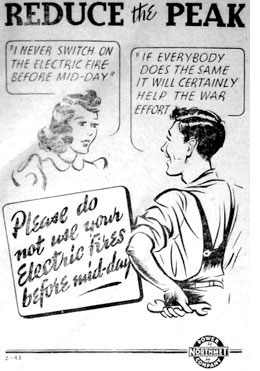 Locally, the H&E Observer added its voice to the call: praising all who worked in ordnance factories, shipyards and on the land, but drawing attention to all those remaining men and women whose age or married status permitted them to continue with jobs that contributed neither to the war effort nor to carrying on essential services. Those that doubted they were playing their part in the battle of production were reminded that there were jobs in the Forces, the factories and on the farms. And those doing essential work in offices were reminded there was always the additional half a job of productive effort, working evenings in factories or weekends on farms. Locally, the H&E Observer added its voice to the call: praising all who worked in ordnance factories, shipyards and on the land, but drawing attention to all those remaining men and women whose age or married status permitted them to continue with jobs that contributed neither to the war effort nor to carrying on essential services. Those that doubted they were playing their part in the battle of production were reminded that there were jobs in the Forces, the factories and on the farms. And those doing essential work in offices were reminded there was always the additional half a job of productive effort, working evenings in factories or weekends on farms.
One area where production exceeded all expectation was childbirths – aided no doubt by members of the Forces making the most of their time on leave. Over 15,500 more babies were born during the first 9 months of 1942 than in the first 9 months of 1939, the consequence of which was a plea for more qualified midwives.
For those fighting in South-East Asia, however, leave-time was not an option and many would never see their home or loved ones again. Of the estimated 20,000 men being held prisoner in Japan and elsewhere in the Far East, half the total number was believed to be Americans and the other half made up of British, Canadians and Australians.
In the week beginning 11 January, film goers in Bishop's Stortford had the choice of four movies, all starring major actors of the time. Showing at the Regent cinema for 3 days, Jan 11–13 was Secret Mission with Hugh Williams and James Mason, and from Jan 14–16, My Gal Sal starring Rita Hayworth and Victor Mature. At the Phoenix there was a 3-day showing of Salute John Citizen with Stanley Holloway, followed by a 3 day showing of Miss Annie Rooney starring Shirley Temple.
That same week a report in the H&E Observer revealed how, despite use of the wireless in modern warfare, tens of thousands of carrier pigeons were still flying in the service of their country. They were used when wires and wireless failed; sometimes in place of dispatch riders when roads were congested or impassable; or just to save petrol. There were, though, many pigeons being killed or wounded in this country while on active service and the following plea was made to all holders of gun licences.. ‘Look before you shoot a pigeon.’
 On the Home Front, German bombers once again targeted London, the following diary entry being recorded by Frank Warboys – a young man living at Sunset Cottages near to Thorley school: On the Home Front, German bombers once again targeted London, the following diary entry being recorded by Frank Warboys – a young man living at Sunset Cottages near to Thorley school:
18 January 1943. Last night there was terrific gunfire over London. It started about 8pm, about ten minutes after our siren went. The firing was incessant for about two hours; shells, gun flashes and flaming onions filled the sky over London way. This was evidently a reprisal for our raid on Berlin. 8.30 pm… we have just had another one and a half hour alert. We could hear planes heading towards the Midlands.
On 21 January, a daylight raid by German bombers destroyed a south London girls school killing 6 teachers and 38 pupils, most under the age of seven. Tragic though this incident was, thousands of evacuees still felt it safe enough to return to their city homes. This in turn reduced dramatically the population of many rural towns, including Bishop’s Stortford, to almost pre-war levels.
Here, though, a lesser population made little difference to the haphazard distribution of food and merchandise, and shortages were still apparent. Two notable gripes by residents was that they still had to queue for cakes, while in London cakes were plentiful, and that plain ordinary cups 'so often broken in the home' were difficult to come by. The problem was seemingly resolved with the arrival of white utility china cups, but even this raised complaints because in parts of northern England, crockery was plentiful!
A shortage of china cups, utility or otherwise, was the least of the Nazi's worries at this time, their siege of Stalingrad ending on 2 February when over 120,000 German troops surrendered to the Russians. The 199 days siege, which had cost the Germans around 800,000 lives, was to prove a significant turning point of the war.
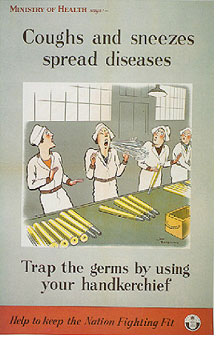 On 9 February shoe rationing was added to the long list of restricted merchandise and foods in Britain, each person now limited to just three pairs of shoes for the remainder of the year.
On 9 February shoe rationing was added to the long list of restricted merchandise and foods in Britain, each person now limited to just three pairs of shoes for the remainder of the year.
At the local Petty Sessions this month several lorry drivers were each fined 30 shillings (£1.50) for exceeding 30mph within the speed limit, caught by the Police using a stopwatch to time their vehicles over a measured distance. At the same sessions Magistrates treated the theft of a watch by a 17 year-old youth from Birchanger with lenience and common sense. Previously held on remand and given time to choose between serving a prison sentence or joining the Army, he joined up for 12 years. The bench congratulated him on his decision, adding that he should serve his country well to make up for past indiscretion.
At a council meeting it was suggested, and agreed, that the town should form a closer relationship with crew members of the adopted Corvette, HMS Clover, and that a committee be formed with the object of keeping in touch and occasionally sending the crew some comforts and small luxuries. At the same meeting the Medical Officer revealed 26 cases of measles and 3 cases of scarlet fever had been notified in the district during the previous month and, once again, the council sanctioned use of the flower beds in Castle Gardens for growing food crops – provided they were later sold.
Bishop’s Stortford's Aid-To-Russia Week began on 13 March, in which it was hoped £1,500 would be raised through public donations. That same day it was learned that a bomb planted in Hitler's plane failed to explode as he flew from Smolensk to his headquarters.
When new clothing coupons became valid on 15 March the H&E Observer made a plea to the public not to use them all at once. Resisting the urge to spend them on fanciful items would give everybody a fair share of things, it said. No such choice had been given to Ice cream lovers when its manufacture and sale was banned on 1 October 1942, or to sweet lovers who had to live without their favourite chocolate from 20 March 1943. Its replacement, known as Ration Chocolate, was said to have been about as appetizing as cardboard.
Readily available, however, was a publication entitled 'Roof Over Britain'. Costing 9d and telling the story of Britain's Ack-Ack Defence, it was prepared for the War Office and the Air Ministry by the Ministry of Information. Often underestimated AA crews more than fulfilled their important role, shooting down 600 planes over this country during the first two years of war. Fighters destroyed about six times this many over the same period, but three times our AA gunners shot down more than 50 German aircraft in a week. Their record bag for one day was 23 destroyed on 15 August 1940, which, when you consider that Ack-Ack was like 'shooting a pheasant with a rifle in the dark', is pretty impressive.
 On Sunday 28 March the District Musical Association gave a rendition of Mendelssohn's Elijah at the Congregational church in Water Lane, and on Thursday 1 April the Royal Air Force celebrated its 25th Anniversary. On Sunday 28 March the District Musical Association gave a rendition of Mendelssohn's Elijah at the Congregational church in Water Lane, and on Thursday 1 April the Royal Air Force celebrated its 25th Anniversary.
At the start of April, town residents found themselves slightly better off when the town council announced a reduction of fourpence in the Pound in the general rate for the coming 12 months. It was pointed out, however, that heavy expenditure would be necessary to make arrears of maintenance work after the war, which would in all probability mean increased rates then. Work would include street lighting and making good footpaths and roads that had been neglected owing to a shortage of labour and materials.
Well in hand by now were preparations for the 'Holidays-at-home' entertainment scheduled for the summer months. This was promoted to be on a far more ambitious scale than the previous two years, though it does appear that not all members of the Summer Entertainment Committee were rowing in the same direction. A proposition that an amusement fair at Easter and in August should be allowed was lost by 5 votes to 4, one of those against saying he disagreed with providing facilities for young people to spoil themselves.
On Tuesday 20 April (Adolf Hitler's 54th birthday) Prime Minister Winston Churchill announced that the rules were being relaxed and that henceforth, church bells could be rung on Sundays and special days. On Easter Sunday 25 April, the bells rang out across England for the first time since the start of the War.
Yet another incentive for the public to help fund the war effort was Wings for Victory week, which in Bishop's Stortford was 1 – 8 May. The Corn Exchange played host to the opening ceremony and the ever-optimistic town and district committee set a savings target of £100,000 – enough to buy 2 Lancaster Bombers and 4 escorting spitfires. They were not disappointed, the actual total raised amounted to £133,754
On 13 May it was learned how for the first time in the war the British could claim more German prisoners than the Germans had British. But good news is often followed by bad and on 16 May German troops crushed the last resistance of the Warsaw Ghetto uprising. Of more than 56,000 Jews captured, 7,000 were shot. Those that survived were sent to the Treblinka concentration camp where most of them later died. On 19 May, Berlin was declared "Judenrien" (free of Jews).
 May was also the month when the USAAF 850th Aviation Engineering Battalion arrived to start work on the runways and taxiways at Stansted. The Battalion remained until April 1944. May was also the month when the USAAF 850th Aviation Engineering Battalion arrived to start work on the runways and taxiways at Stansted. The Battalion remained until April 1944.
At the end of the month it was learned that those committee members who had opposed an amusement fair as part of the summer entertainment programme had now had second thoughts, and a fair was to be allowed from 10-16 June.
Arrangements had also been concluded for entertainment at Whitsun and August Bank Holiday, as well as for Wednesday, Saturday and Sunday of each week throughout the summer. The venue as in previous years was to be Castle Gardens and the usual grant of £20 was increased to £50. Children would enjoy swings and roundabouts, Punch and Judy shows, swimming galas and a display by local scouts, while adults would have concert parties and concerts by military bands. A stage was to be erected in the North West corner of the tennis courts and the court areas used as an enclosure for audiences. Castle Gardens was to remain open until 10.30 pm for dancing.
Also able to enjoy Stortford’s summer entertainment were the 515 official evacuees and war workers accommodated in the district. There was room for more but an advertisement inviting householders to register with the Evacuation Department if they were willing to provide accommodation for transferred war workers, received no response. Householders reasoned that before committing themselves they wanted to know what payment they would receive for providing accommodation. The Town Clerk responded by saying that although the council had the power to delegate which householders took in war workers, the question of payment would be between the householder and war worker.
A spitfire crashed north of Sawbridgeworth on 3 June, though the cause was never made public. And on Wednesday 9 June, 'Holidays-at-home' was officially opened with a display of dancing and gymnastics by local school children.
Accommodation was on the town council’s agenda again in July, when concern was raised about the lack of it for members of the Forces and other persons who found themselves stranded in the town after 10pm. A resident’s suggestion that the Market Square shelter should be used when the occasion arose was upheld, and the Welfare Officer at Hertford would be asked to supply blankets. One council member thought it a scandal that no accommodation had been provided by the authorities, saying that 'if there was much more dilly-dallying, the war would be over before anything was done.'
At the same meeting, residents were condemned for not attending demonstrations by the Fire Guard staff on tackling firebombs, more especially those who lived in the Potter Street, South Street and New Town area. Nor, it was said, had very many cooperated in any fire prevention schemes.
Concern also by the Bishop's Stortford Youth Committee over the increase in venereal disease. This led to the suggestion that the council should appoint a new Moral and Social Committee to educate the public to combat the dangers of the scourge.
In Italy on 25 July, another scourge was eradicated with the ousting from power of fascist dictator Benito Mussolini. And in a bid to weaken morale of the German population, Bomber Command took the war to Germany with a vengeance. Successful attacks on the industrial area of the Ruhr in March were followed in the summer by Operation Gomorrah – night and day attacks on Hamburg by the RAF and USAAF. Between 24 July and 3 August, more than 10 thousand tons of high explosives and incendiaries rained down on the city, the firestorm following a single raid on the night of 27/28 July killing as many as 50,000 citizens and injuring 40,000. More than a million homeless and injured people were forced to evacuation the city.
One of the incongruities of war is that while people are being killed and maimed in one part of the world, someone in another part can find time to complain about people enjoying themselves. Such was the case during Stortford’s summer entertainment programme, when one Hockerill Street resident complained that amplified music in Castle Gardens was played too loudly at weekends. The complainee could neither read nor sleep or hold a conversation, and thought townspeople would get far greater enjoyment by listening to a few good band performances or concerts instead of amplified music. It transpired that if three householders signed a statement of complaint about noise nuisance then the police could stop it, but it was hoped it wouldn't come to this. A plea by another resident for one of the tennis courts to remain open for use during the summer was refused by the council, who said they would all remain closed for the benefit of the larger majority and that they couldn’t please everybody.
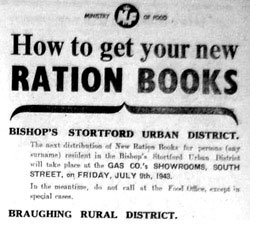 Among the long list of offences judged at the Petty Sessions in July was a lorry driver heavily fined (£20) for dangerous driving in Sawbridgeworth; a Stortford man fined £1 (and 5 shillings costs) for using his car outside the permitted radius; a 21 year-old fined £5 for assaulting a woman; a 62 year-old of Haymeads Institution being sent to prison for three months on a charge of indecency; and an officer in the ATS fined £2 (and 1s. 4d costs) for allowing a light to show at her home. There was also this rather amusing case of theft. Joseph Clark of Harlow was fined £2 10s for stealing an egg and £2 10s for stealing a mackintosh. The alternative to paying the fine was 23 days imprisonment for each offence. Mr Clark pleaded guilty to the first charge of stealing an egg and asked for the theft of a further 12 eggs to be taken into consideration. Among the long list of offences judged at the Petty Sessions in July was a lorry driver heavily fined (£20) for dangerous driving in Sawbridgeworth; a Stortford man fined £1 (and 5 shillings costs) for using his car outside the permitted radius; a 21 year-old fined £5 for assaulting a woman; a 62 year-old of Haymeads Institution being sent to prison for three months on a charge of indecency; and an officer in the ATS fined £2 (and 1s. 4d costs) for allowing a light to show at her home. There was also this rather amusing case of theft. Joseph Clark of Harlow was fined £2 10s for stealing an egg and £2 10s for stealing a mackintosh. The alternative to paying the fine was 23 days imprisonment for each offence. Mr Clark pleaded guilty to the first charge of stealing an egg and asked for the theft of a further 12 eggs to be taken into consideration.
A grand boxing tournament headlined the penultimate Saturday of summer entertainment in Castle Gardens, with admission costs ranging from 1s. 6d to 3s. 6d. Bouts included all boxing weights but top of the bill was a Middleweight contest between two members of the RAF – Sergeant Bob Cotton and Corporal Steggles. The outcome of the fight is unknown, but we do know that on 28 August the last event of the season in Castle Gardens was a Grand Fete.
On 3 September British troops landed on mainland Italy, followed six days later by the Americans. The new Italian government had in fact already formally surrendered to the Allies in Sicily on 3 September, but this was kept secret until 8 September when the invasion of Italy was well under way. News of the Allied assault certainly made headlines here, but came too late to be part of the detailed facts and figures released by the government of the triumphs of the fighting services and the Home Front over the past 4 years of war.
The release of such information was primarily to boost public morale and most newspapers, including the H&E Observer dated 11 September, duly obliged by publishing it. The report has no relevance to this history of Bishop’s Stortford but is certainly worth reading.
How the fourth year of the war has seen the United Nations turn from the defensive to the offensive. Stubborn toil laid the foundations of the greater offensives which must lead to victory. The British Army, aided by US forces in French North Africa, has freed the whole of the African Continent from the Axis grip.975,000 men were the total of Axis casualties in Africa. More than 248,000 of these were Germans. 230,000 killed, wounded and missing were the total casualties suffered by the forces of the British Empire in the African and Middle Eastern theatre of war. At least 248,000 enemy prisoners and 26 generals were captured in Tunisia between May 5 and May 13, 1943. This constitutes one of the greatest defeats inflicted on the German Army. 2,550 tanks, 6,200 guns and 70,000 lorries were captured or destroyed by the British and Allied troops in all the African campaigns.
More than 140,000 British and Allied vessels have been convoyed by the Royal Navy and losses in these convoys up to December 1942 were kept down to about one half of one percent. 850 ships, including 350 warships, were engaged in Anglo-American operations against French North Africa. Two of the three major convoys sailed from Britain in the protection of the Royal Navy and the Air Force. 3,000 ships were engaged in the Anglo-American attack on Sicily – the greatest amphibious operation of all time. In the initiial assault 160,000 men, 14,000 vehicles, 600 tanks and 1,800 guns were transported.
In the Mediterranean 2 Axis battleships, 14 cruisers, 98 destroyers and torpedo-boats and many submarines and auxiliaries had been destroyed up to June 23, 1943. 5,000,000 tons of German and Italian merchant shipping were sunk or captured and nearly 3,000,000 tons damaged by the Royal Navy together with the RAF, up to March 3, 1943.
100,000 tons of bombs had been discharged by Bomber Command on Germany by the end of May 1943. In a one hour raid on Dortmund on May 23-24, 1943, RAF bombers dropped more than eight times the weight dropped on Coventry during an all-night raid in November 1940, ie more than 2,000 tons against 225, In three raids on the port of Hamburg in the last week of July 1943, well over 7,000 tons of bombs were dropped – nearly as much as the Luftwaffe dispersed over the whole London area in the eleven months between September 1940 and July 1941.
The percentage increase in output of munitions for the first six months of 1940, 1941, 1942, 1943 was, respectively: 1940, 100%; 1941, 150%; 1942, 230%; 1943, 300%. Output of heavy bombers trebled during the 12 months ended May 1943.
Monthly output of small arms and ammunition is now measured in terms of hundreds of millions. By March 1943 more than 900 warships, ranging from trawlers to battleships, had been completed in British shipyards, at home and overseas since the outbreak of war.
Britain was 40% self-sufficient in food before the war. She is now 70% self-sufficient. British acreage of wheat, cereals and oats had risen in 1942 by 35%, 65%, and 72% respectively since the outbreak of war. There are now 1,700,000 allotments – double the pre-war figure, while about 5,000,000 garden owners contribute to the war effort, thus releasing land for crops private individuals cannot grow.
In September, Superintendent PJ Green, in charge of Bishop’s Stortford Division for over six years, retired after 29 years service in the Hertfordshire Constabulary. And on Sunday 26 September a joint celebration of Battle of Britain Sunday and Civil Defence Day included a church parade and service in Castle Gardens attended by more than 1,500 people. Also announced this month by the town council was a rate reduction of 2d to 5s. 5d in the Pound for the half-year starting 1 October.
Optimism that the war might soon be over after the Allies invasion of Italy were further fueled on 13 October when Italy itself declared war on Germany.
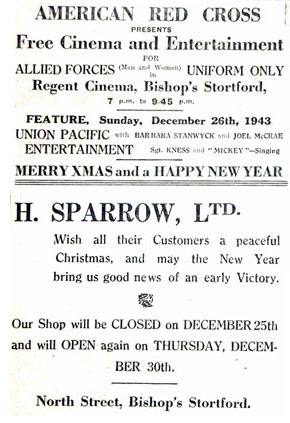 A week or so later, town councilor William Hughes prompted a discussion on the future of Bishop's Stortford. The time had now come, he said, to consider the town's post-war reconstruction and for the council to act as a committee and prepare plans for the future. Stating his own views, he said the most imperitive need was for housing. There had been no house building for 4 years, the population of the town had increased, and men returning from the war to their families would be looking for new homes. Water supply would also need upgrading because the old formula of 33 gallons per day per person would no longer suffice, and the whole sewerage system needed relaying. Also required, he said, would be a public library and reading room, municipal offices and a town hall – the latter, perhaps, to stand as a war memorial. In conclusion he said that preparation should also begin of a comprehensive plan for the layout of the Castle Gardens and Town Meads as a planned park in a central position. A week or so later, town councilor William Hughes prompted a discussion on the future of Bishop's Stortford. The time had now come, he said, to consider the town's post-war reconstruction and for the council to act as a committee and prepare plans for the future. Stating his own views, he said the most imperitive need was for housing. There had been no house building for 4 years, the population of the town had increased, and men returning from the war to their families would be looking for new homes. Water supply would also need upgrading because the old formula of 33 gallons per day per person would no longer suffice, and the whole sewerage system needed relaying. Also required, he said, would be a public library and reading room, municipal offices and a town hall – the latter, perhaps, to stand as a war memorial. In conclusion he said that preparation should also begin of a comprehensive plan for the layout of the Castle Gardens and Town Meads as a planned park in a central position.
Though one member thought Mr Hughes was ‘asking for utopia’ most members were in favour of his proposals in principle, but didn't think this was the time for detailed planning. It was agreed, however, to form a sub-committee to consider post-war improvements. At the same council meeting it was revealed that public support for this year's summer entertainment programme was not all it might have been, and that a profit of nearly £200 was largely due to a dance held at Long's dance hall in North Street. Poor attendance was put down to people having very little spare time, and cold weather at the start of the summer.
On Thursday 26 October, Frank Warboys from Thorley recorded in his diary that the air-raid siren had sounded for eight consecutive nights, and on 8 November recorded that there had been ‘air-raids almost every night lately.’ He also wrote of watching *Italian prisoners of war working in the fields of sugar beet at Twyford.
*It's most likely these PoWs came from the nearest PoW camp at Hallingbury
This month the annual report of the Bishop’s Stortford Savings Association commented that small savings in the town was not satisfactory, adding that there were still considerable amounts of money in the town’s banks that could be converted into savings with no loss in value to the saver i.e. Defence Bonds and Certificates. One suggestion put forward was that all extra money earned in households should be put into National Savings.
On 24 November a USAAF Mustang fighter aircraft crashed north of Sawbridgeworth.
From November 1943 to March 1944 Berlin was under continual bombardment by the RAF and USAAF
At the start of December, town councilors continued the debate about a War Memorial and how to honour the fallen. This followed a suggestion by the local British Legion that a War Memorial should take the form of a housing scheme of cottages for the use of disabled and aged ex-servicemen and women and widows of ex-servicemen. While one councillor said he would prefer it be called a ‘Peace Memorial’ and most thought a housing scheme was a good idea, all agreed that the time was not right to launch a public campaign to raise funds.
Also heard was the report from the sub-committee appointed to consider the general lines of post-war improvement of the town’s services and amenities. All agreed that housing was the primary duty of the council and that allied to this was provision of adequate sewerage and water supply facilities. But until the government informed local authorities of the basis on which they could proceed with building, nothing could be done. Therefore, to save time when schemes could be submitted for the Ministry's approval, plans should be prepared now for the sites already owned by the council, and for construction of roads, sewers and water mains. They also agreed that a town hall, combining municipal offices and a public ibrary would have to be provided for the post war generation, suggesting a suitable site for all this was council owned land on the north side of the Causeway.
In summing up, one councillor said it would be good if in 20 years time it could be said 'In 1943 Bishop’s Stortford had a council with vision'. In sharp contrast, another who opposed all suggestions thought all the work would be for nothing and probably be scrapped and that, in his opinion, the council meeting was a complete waste of time. Nine members voted for the recommendations, 1 was against and 2 abstained.
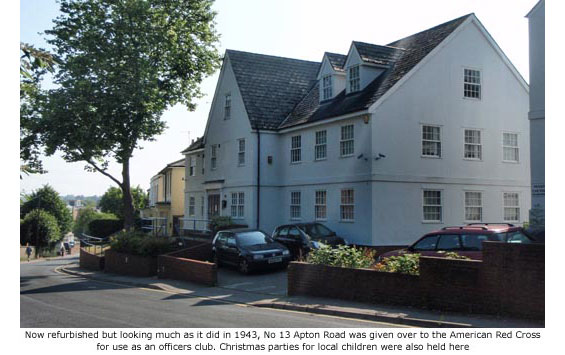
In the run-up to Christmas many children in the district shared in the gift of candy, sent to this country by the American Red Cross for inclusion in school parties on the last day of term. Hard candy was boiled sweets like 'Lifesavers', and chocolate came in the form of Hershey Bars. American troops also introduced older children to chewing gum and American comics that featured characters like Superman, Captain Marvel, Li'l Abner, Bugs Bunny and Loony Toons.
On Christmas Eve about fifty evacuee children were invited to a huge party at the US Red Cross Services Club in Apton Road. There the programme of games and music included a magician, carols sung by the children themselves and the appearance of one of the American soldiers dressed as Santa Clause and bringing Christmas stockings with candy and balloons. Later, a truck travelled about the town handing out more candy and Hershey Bars to children, and another consignment was taken to Haymeads Hospital for children who were sick. At the car park there, more candy was distributed to about a 1,000 children from a truck pulled by a tank.
Americans' generosity also extended to arranging free entertainment at the Regent cinema on Boxing Day evening for all uniformed Allied Forces (men & women). The feature film shown was Union Pacific with Barbara Stanwyck and Joel McCrae, and entertainment was by Sgt Knees and ‘Mickey’ – singing. Thereafter the Regent became a regular Sunday night venue for Allied forces stationed in the district when a special 16mm film projector was set up at the front of the balcony.
By the end of 1943 there were around 770,000 US forces in Britain
A Christmas Festival organised by the Anglo-Russian Friendship Committee to raise £1500 for a ward in the rebuilt Stalingrad Hospital, had by Christmas Day raised £550. The ward was to be named Stortford and District Ward.
|


 Locally, the H&E Observer added its voice to the call: praising all who worked in ordnance factories, shipyards and on the land, but drawing attention to all those remaining men and women whose age or married status permitted them to continue with jobs that contributed neither to the war effort nor to carrying on essential services. Those that doubted they were playing their part in the battle of production were reminded that there were jobs in the Forces, the factories and on the farms. And those doing essential work in offices were reminded there was always the additional half a job of productive effort, working evenings in factories or weekends on farms.
Locally, the H&E Observer added its voice to the call: praising all who worked in ordnance factories, shipyards and on the land, but drawing attention to all those remaining men and women whose age or married status permitted them to continue with jobs that contributed neither to the war effort nor to carrying on essential services. Those that doubted they were playing their part in the battle of production were reminded that there were jobs in the Forces, the factories and on the farms. And those doing essential work in offices were reminded there was always the additional half a job of productive effort, working evenings in factories or weekends on farms. On the Home Front, German bombers once again targeted London, the following diary entry being recorded by Frank Warboys – a young man living at Sunset Cottages near to Thorley school:
On the Home Front, German bombers once again targeted London, the following diary entry being recorded by Frank Warboys – a young man living at Sunset Cottages near to Thorley school: On 9 February shoe rationing was added to the long list of restricted merchandise and foods in Britain, each person now limited to just three pairs of shoes for the remainder of the year.
On 9 February shoe rationing was added to the long list of restricted merchandise and foods in Britain, each person now limited to just three pairs of shoes for the remainder of the year. On Sunday 28 March the District Musical Association gave a rendition of Mendelssohn's Elijah at the Congregational church in Water Lane, and on Thursday 1 April the Royal Air Force celebrated its 25th Anniversary.
On Sunday 28 March the District Musical Association gave a rendition of Mendelssohn's Elijah at the Congregational church in Water Lane, and on Thursday 1 April the Royal Air Force celebrated its 25th Anniversary. May was also the month when the USAAF 850th Aviation Engineering Battalion arrived to start work on the runways and taxiways at Stansted. The Battalion remained until April 1944.
May was also the month when the USAAF 850th Aviation Engineering Battalion arrived to start work on the runways and taxiways at Stansted. The Battalion remained until April 1944. Among the long list of offences judged at the Petty Sessions in July was a lorry driver heavily fined (£20) for dangerous driving in Sawbridgeworth; a Stortford man fined £1 (and 5 shillings costs) for using his car outside the permitted radius; a 21 year-old fined £5 for assaulting a woman; a 62 year-old of Haymeads Institution being sent to prison for three months on a charge of indecency; and an officer in the ATS fined £2 (and 1s. 4d costs) for allowing a light to show at her home. There was also this rather amusing case of theft. Joseph Clark of Harlow was fined £2 10s for stealing an egg and £2 10s for stealing a mackintosh. The alternative to paying the fine was 23 days imprisonment for each offence. Mr Clark pleaded guilty to the first charge of stealing an egg and asked for the theft of a further 12 eggs to be taken into consideration.
Among the long list of offences judged at the Petty Sessions in July was a lorry driver heavily fined (£20) for dangerous driving in Sawbridgeworth; a Stortford man fined £1 (and 5 shillings costs) for using his car outside the permitted radius; a 21 year-old fined £5 for assaulting a woman; a 62 year-old of Haymeads Institution being sent to prison for three months on a charge of indecency; and an officer in the ATS fined £2 (and 1s. 4d costs) for allowing a light to show at her home. There was also this rather amusing case of theft. Joseph Clark of Harlow was fined £2 10s for stealing an egg and £2 10s for stealing a mackintosh. The alternative to paying the fine was 23 days imprisonment for each offence. Mr Clark pleaded guilty to the first charge of stealing an egg and asked for the theft of a further 12 eggs to be taken into consideration. A week or so later, town councilor William Hughes prompted a discussion on the future of Bishop's Stortford. The time had now come, he said, to consider the town's post-war reconstruction and for the council to act as a committee and prepare plans for the future. Stating his own views, he said the most imperitive need was for housing. There had been no house building for 4 years, the population of the town had increased, and men returning from the war to their families would be looking for new homes. Water supply would also need upgrading because the old formula of 33 gallons per day per person would no longer suffice, and the whole sewerage system needed relaying. Also required, he said, would be a public library and reading room, municipal offices and a town hall – the latter, perhaps, to stand as a war memorial. In conclusion he said that preparation should also begin of a comprehensive plan for the layout of the Castle Gardens and Town Meads as a planned park in a central position.
A week or so later, town councilor William Hughes prompted a discussion on the future of Bishop's Stortford. The time had now come, he said, to consider the town's post-war reconstruction and for the council to act as a committee and prepare plans for the future. Stating his own views, he said the most imperitive need was for housing. There had been no house building for 4 years, the population of the town had increased, and men returning from the war to their families would be looking for new homes. Water supply would also need upgrading because the old formula of 33 gallons per day per person would no longer suffice, and the whole sewerage system needed relaying. Also required, he said, would be a public library and reading room, municipal offices and a town hall – the latter, perhaps, to stand as a war memorial. In conclusion he said that preparation should also begin of a comprehensive plan for the layout of the Castle Gardens and Town Meads as a planned park in a central position.